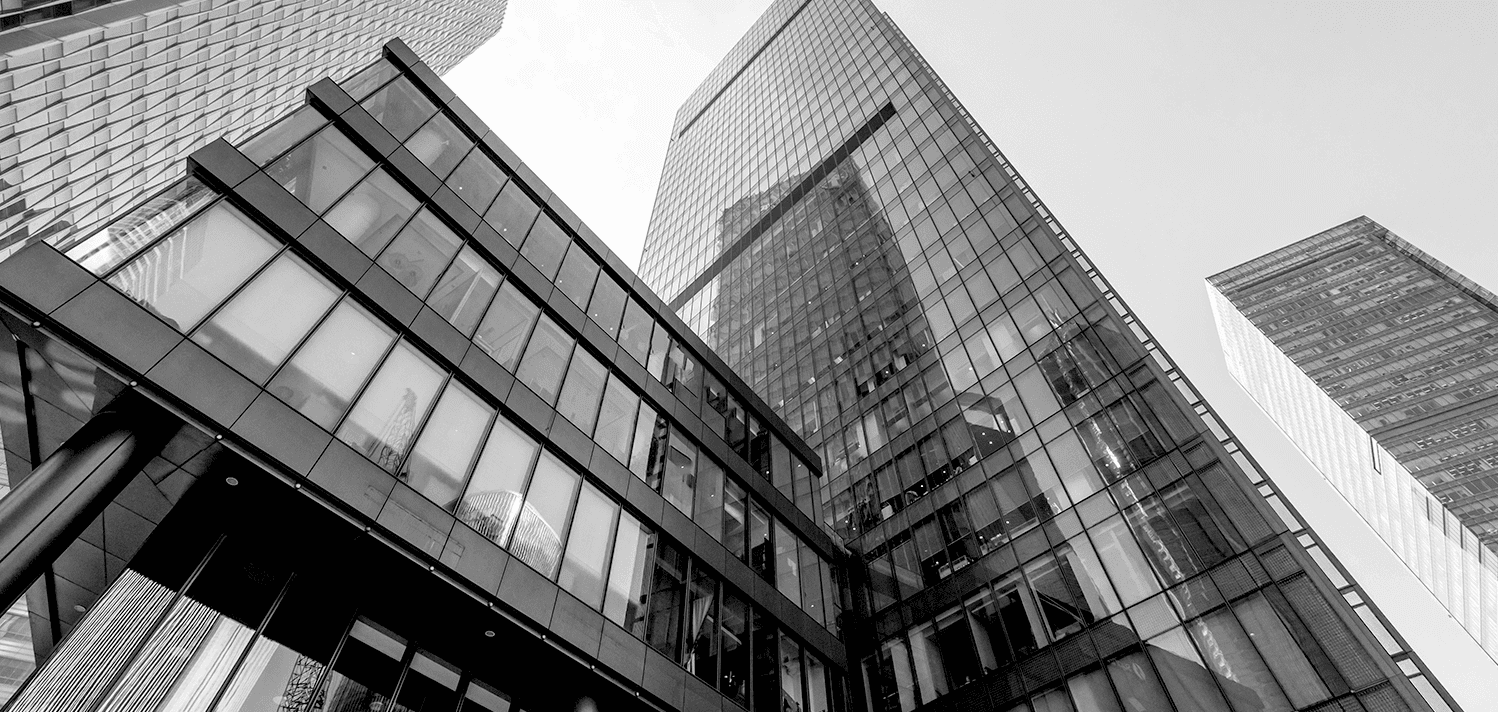The rise of sustainable glazing solutions in the construction industry
- 26 September 2025
- News
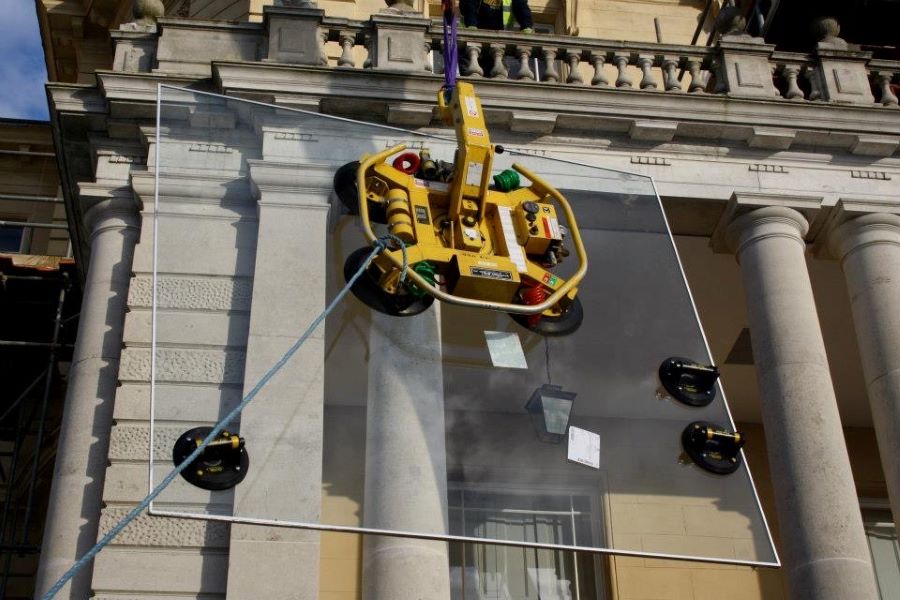
The construction industry stands at a pivotal moment. As climate change accelerates and environmental regulations tighten, sustainable glazing solutions have emerged as a crucial component in the race towards net-zero buildings.
Modern glazing technology is no longer just about letting light in – it plays a vital role in energy conservation, thermal performance and reducing the environmental impact of commercial buildings.
The UK flat glass market is expected to reach £6.2 billion by 2032, driven largely by demand for energy-efficient and sustainable building materials. This growth reflects a fundamental shift in how the glass industry approaches building design, with sustainability goals becoming a top priority for developers, architects and building owners alike.
At SGC Glass, we’ve witnessed this transformation firsthand. Since 1995, we’ve evolved from traditional glazing specialists to champions of sustainable construction, helping clients across London, Essex and surrounding areas achieve their environmental objectives through advanced glazing solutions.
The crucial role of glazing in sustainable architecture
Glazing systems significantly influence a building’s energy performance, accounting for up to 40% of heat loss in commercial buildings and affecting everything from heating costs to occupant comfort. The pivotal role of modern glazing extends far beyond basic weather protection.
Key sustainability benefits of advanced glazing:
- Energy efficiency: Superior thermal insulation reduces energy consumption for heating and cooling
- Natural light optimisation: Maximises daylight while minimising solar heat gain
- Carbon emissions reduction: Lower energy usage directly reduces greenhouse gas emissions
- Thermal comfort: Better temperature control reduces reliance on artificial climate systems
- Acoustic performance: Reduces noise pollution in urban commercial spaces
The integration of smart technologies and innovative design approaches has transformed glazing from a building envelope component into an active participant in sustainable building performance.
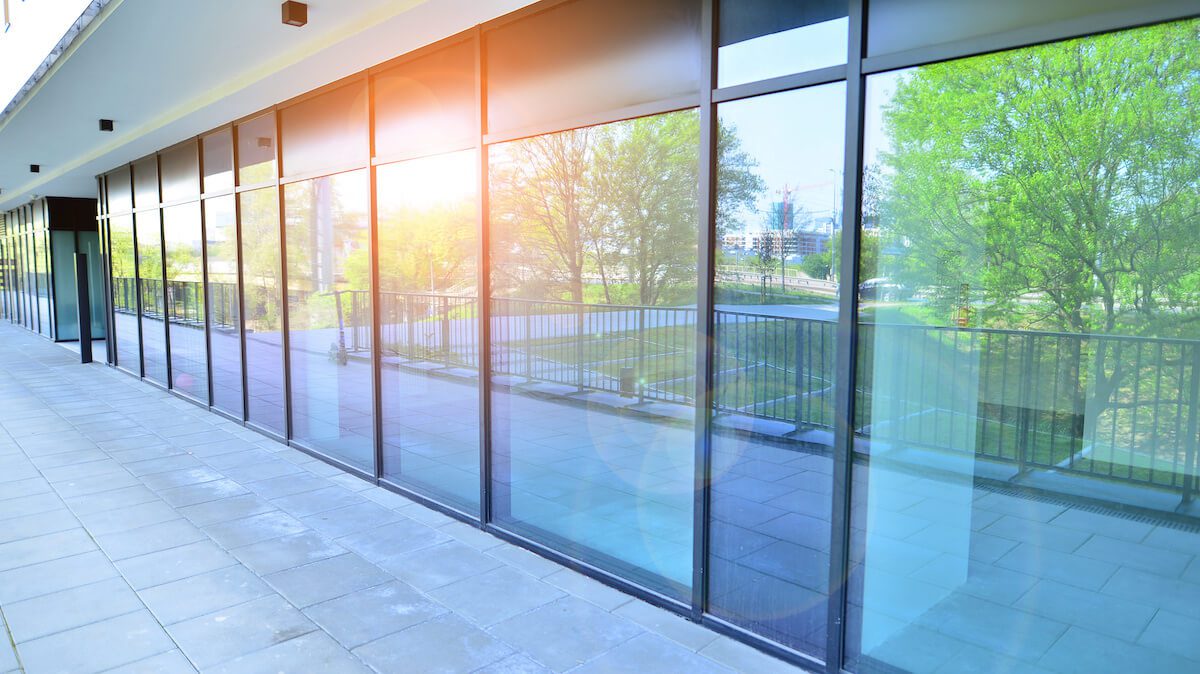
Energy performance and thermal insulation advances
Modern glazing solutions deliver exceptional thermal performance through multiple innovations. Double and triple glazing systems with low-emissivity coatings can reduce heat transfer by up to 70% compared to single glazing, while advanced gas fills further improve thermal insulation properties.
Leading thermal performance technologies:
- Low-E coatings: Microscopic metallic layers reflect heat while allowing visible light transmission, reducing both heat loss in winter and heat gain in summer.
- Multi-pane systems: Triple glazing provides superior thermal insulation, making it ideal for commercial buildings targeting the highest energy performance standards.
- Thermal breaks: Advanced frame systems minimise heat transfer through the glazing structure itself, eliminating thermal bridges that compromise overall performance.
- Dynamic glazing: Smart glass technology adjusts transparency and thermal properties in response to environmental conditions, optimising both natural light and energy efficiency.
At SGC Glass, our commercial glazing solutions incorporate these cutting-edge technologies to deliver measurable improvements in building performance and operational costs.
How do sustainable glazing solutions reduce building energy consumption?
Sustainable glazing reduces energy consumption through superior thermal insulation, optimised solar control and maximised natural light penetration. These features work together to minimise heating, cooling and artificial lighting requirements while maintaining excellent occupant comfort.
Smart glass and renewable energy integration
The glass industry continues to innovate with smart glass technologies that actively contribute to energy conservation. Electrochromic glass can switch from clear to tinted on demand, while photovoltaic glazing generates renewable energy directly from building facades.
Building codes and regulatory compliance
Stringent building codes increasingly mandate high-performance glazing in commercial projects. Part L of the Building Regulations requires specific thermal performance standards, while schemes like BREEAM and LEED award credits for superior glazing solutions.
Key regulatory considerations:
- Thermal transmittance (U-values): Maximum allowable heat transfer rates for different building types
- Solar heat gain coefficients: Limits on unwanted heat gain in air-conditioned buildings
- Daylight factors: Minimum natural light requirements for office spaces and commercial buildings
- Energy performance certificates: Higher-rated buildings achieve better market values and rental rates
SGC Glass ensures all installations meet or exceed current regulations while preparing buildings for future regulatory tightening. Our expertise in regulatory compliance gives clients confidence in their long-term investment.
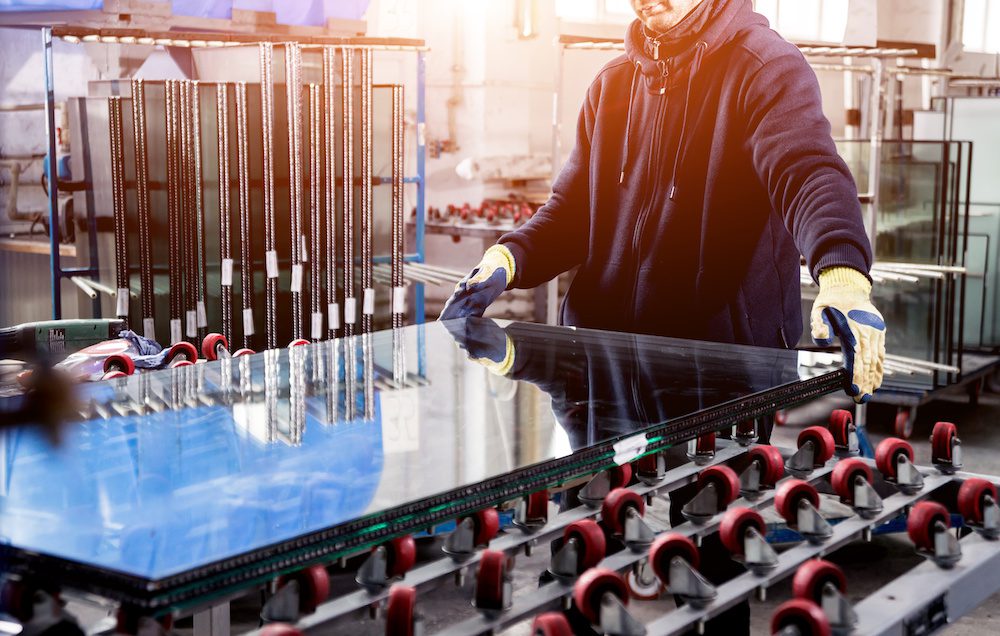
The environmental impact of glass production and circular economy principles
Sustainable glazing extends beyond building performance to encompass the entire product lifecycle. Modern glass manufacturing increasingly adopts circular economy principles, with recycled content reaching up to 90% in some products.
Sustainable manufacturing approaches:
- Recycled content: Post-consumer and post-industrial glass reduces raw material consumption and manufacturing energy requirements.
- Local sourcing: Reduced transportation distances minimise carbon emissions from logistics.
- End-of-life planning: Design for disassembly enables glass recycling at building renovation or demolition.
- Manufacturing efficiency: Advanced production techniques reduce energy usage and waste generation during glass production.
The glass industry’s commitment to sustainability creates positive environmental impact throughout the building lifecycle, supporting broader construction industry sustainability goals.
Commercial applications and real-world benefits
Sustainable glazing delivers tangible benefits across diverse commercial applications. Office spaces achieve better productivity through improved thermal comfort and natural light quality. Government buildings demonstrate environmental leadership while reducing operational costs. Retail environments attract customers with appealing aesthetics while minimising energy usage.
Measured performance improvements:
- Energy savings: 30-50% reduction in heating and cooling costs through superior thermal insulation
- Productivity gains: Studies show 6-16% productivity improvements in naturally lit workspaces
- Property values: Energy-efficient buildings command premium rents and sale prices
- Maintenance reduction: Modern glazing systems require less frequent replacement and repair
SGC Glass has delivered these benefits across numerous commercial projects, from bespoke shopfronts that attract customers while reducing energy costs to high-level glazing installations that define sustainable architectural landmarks.
Innovation in security glazing and fire safety
Sustainable glazing must balance environmental performance with essential safety requirements. Modern security glazing incorporates laminated glass systems that provide impact resistance while maintaining excellent thermal performance. Fire-rated glazing ensures life safety compliance without compromising energy efficiency.
Advanced safety glazing features:
- Multi-layered security: Laminated systems resist impact while maintaining thermal performance
- Fire-rated options: Specially designed glass systems provide fire protection and thermal insulation
- Blast-resistant glazing: Enhanced security without sacrificing sustainable performance
- Emergency egress: Safety features integrated with sustainable design principles
Our comprehensive approach ensures that sustainable glazing solutions never compromise on safety or security requirements.
Cost considerations and return on investment
While sustainable glazing solutions require higher upfront investment, the financial returns justify this expenditure through reduced energy bills, increased property values and lower maintenance costs. Typical payback periods range from 5-10 years, with benefits continuing throughout the building’s operational life.
Financial benefits of sustainable glazing:
- Reduced utility costs: Lower heating, cooling and lighting expenses through improved performance
- Enhanced property values: Energy-efficient buildings achieve premium market prices
- Maintenance savings: Modern glazing systems require less frequent replacement and repair
- Productivity improvements: Better working environments support higher staff performance
- Regulatory compliance: Avoid penalties and future retrofit costs through proactive upgrades
SGC Glass works with clients to optimise the balance between performance and cost, ensuring sustainable glazing investments deliver maximum long-term value.
Working with SGC Glass for your sustainable glazing needs
As sustainability becomes increasingly important in construction, choosing the right glazing partner makes all the difference. SGC Glass combines decades of experience with cutting-edge technology to deliver sustainable glazing solutions that exceed expectations.
Our comprehensive approach covers:
- Design consultation: Working with architects and developers to optimise sustainability outcomes
- Performance specification: Selecting the ideal glazing systems for each application
- Professional installation: Expert fitting using powered access equipment for complex projects
- Quality assurance: Rigorous testing and inspection throughout the installation process
- Ongoing support: Maintenance and repair services to preserve long-term performance
Every project benefits from our commitment to quality, safety and customer satisfaction, backed by CSCS-qualified glaziers and adherence to the highest industry standards.
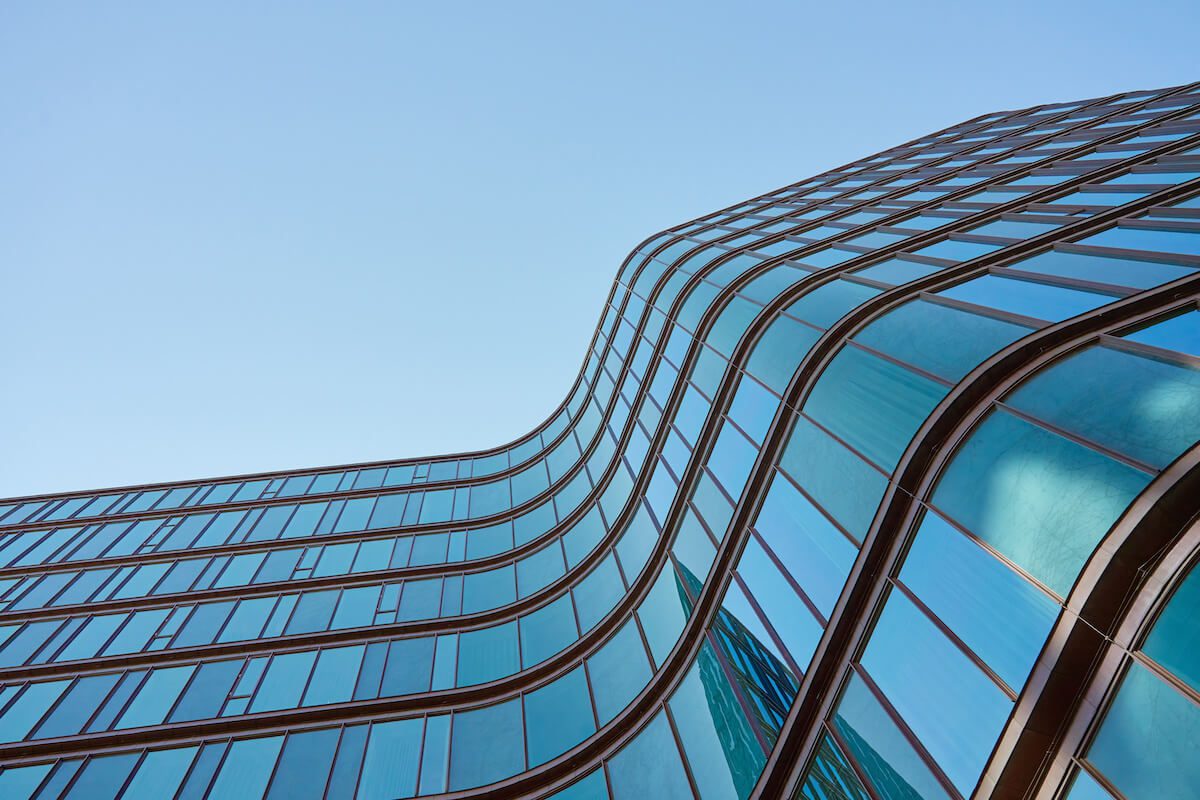
Key takeaways: The sustainable glazing revolution
The rise of sustainable glazing solutions represents a fundamental shift in how the construction industry approaches building performance. Key developments include:
- Advanced thermal insulation technologies delivering exceptional energy performance
- Smart glass systems that actively optimise building energy consumption
- Regulatory frameworks driving adoption of high-performance glazing standards
- Circular economy approaches reducing environmental impact across the product lifecycle
- Proven financial returns through reduced operational costs and increased property values
- Continuous innovation promising even greater sustainability benefits
The construction industry’s commitment to sustainability goals makes advanced glazing solutions essential for commercial projects targeting long-term success.
Transform your next project with sustainable glazing
Whether you’re planning new commercial buildings, refurbishing existing properties or seeking to improve energy efficiency, sustainable glazing provides the foundation for success.
SGC Glass stands ready to support your sustainability goals with expert consultation, cutting-edge technology and professional installation services. Our track record across London, Essex and surrounding areas demonstrates our commitment to delivering glazing solutions that exceed expectations while supporting environmental objectives.
Ready to discover how sustainable glazing can transform your next project?
Contact our expert team today to discuss your specific requirements and learn how SGC Glass can help you achieve exceptional sustainability outcomes through advanced glazing solutions. Together, we can build a more sustainable future, one building at a time.

